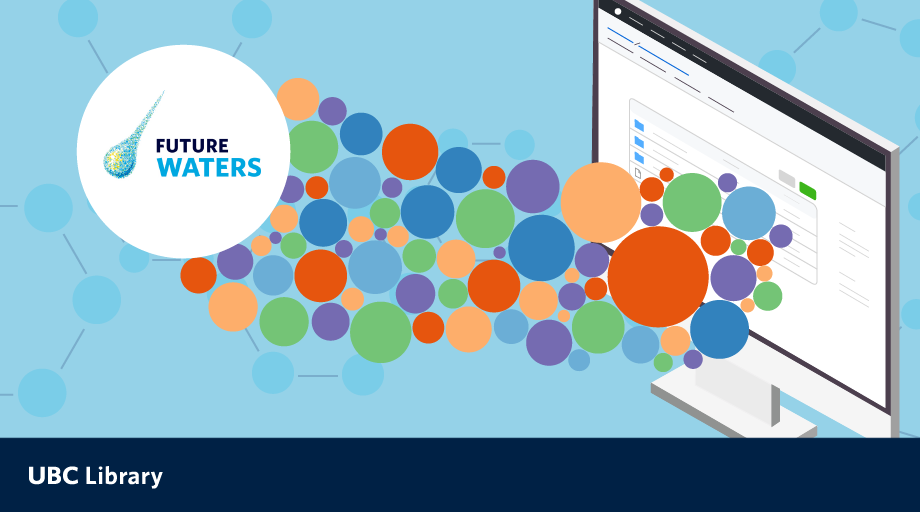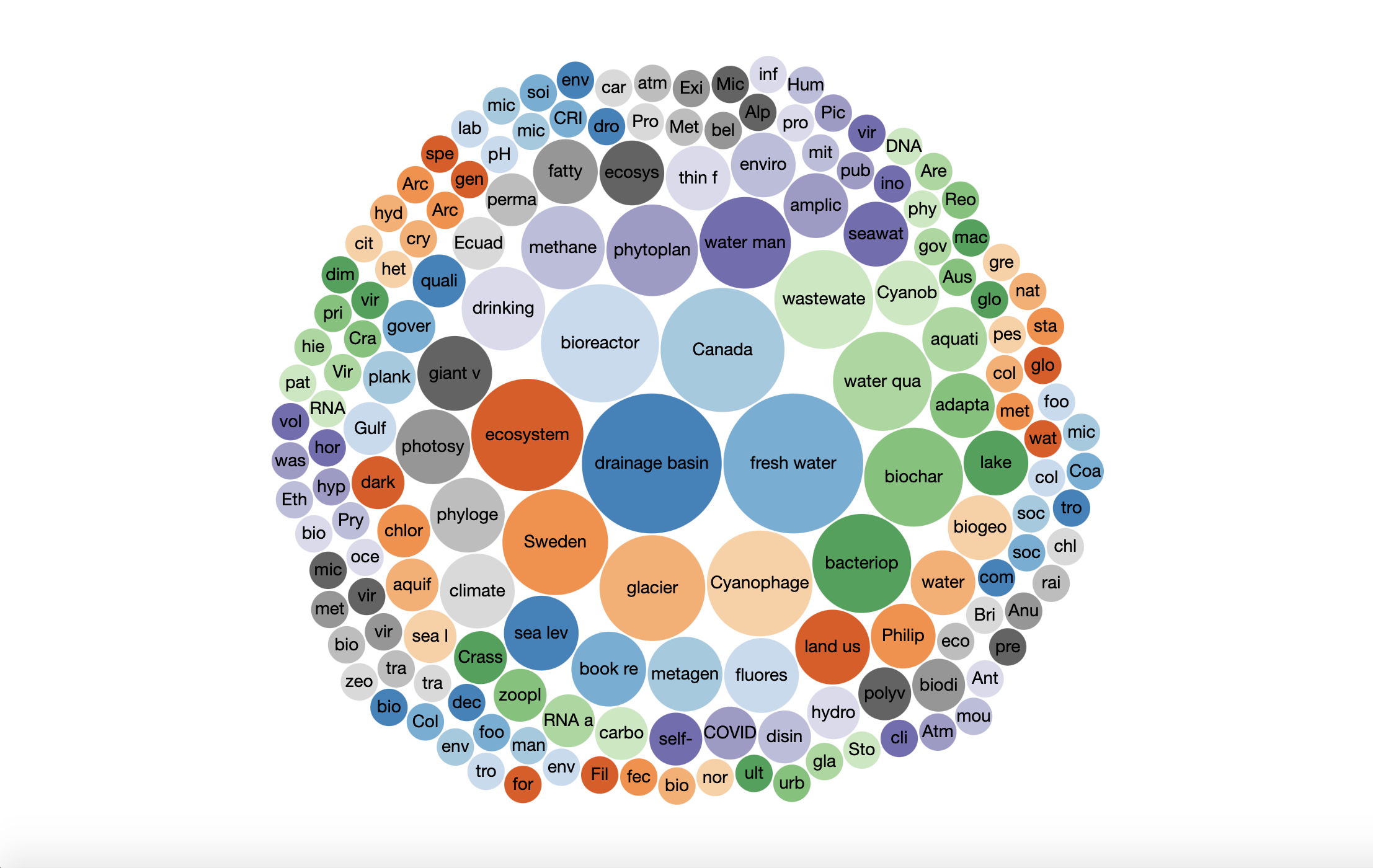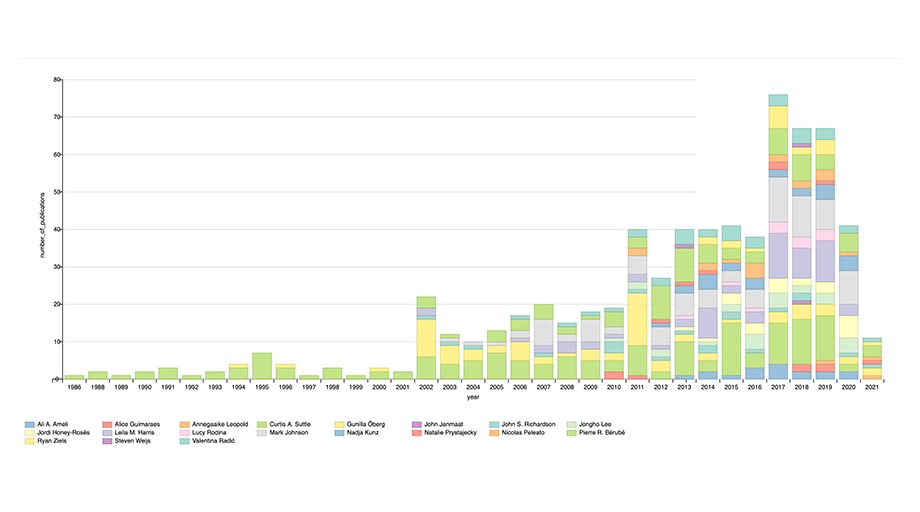
Earlier this year, the UBC Library Research Commons was the successful recipient of the Library innovation grant, to create a research network visualization prototype. The Research Commons partnered with the UBC Future Waters Research Excellence Cluster to find a workflow that would create graphical representations of the cluster’s publication information using pre-existing records in Wikidata and other open source tools. The library’s work on this project has made it possible for other research groups to make use of the same model to visualize their own work by providing a free, open-source, downloadable version of the workflow.
“I worked on a project at McGill prior to coming to UBC where we did something really similar,” says Ekatarina (Eka) Grgurić, Digital Scholarship Librarian at the Research Commons and the project’s technical lead. “We used a tool called Scholia, which sits on top of Wikidata. Any publication data that you put into Wikidata can be remixed and represented through Scholia, which creates a report with visualizations.”

A visualization that shows what topics are addressed the most in the cluster’s research.
Since the grant had a finite timeline of 13 weeks, the library team—which included Community Engagement Librarian Allan Cho as the project lead, UBC mining engineering doctoral student Alice Guimarães as the Future Waters’ designate, and with oversight provided by Research Commons’ Head Eugene Barsky—planned a project that could be done quickly and relatively easily within the scope of the grant’s rapid timeline and modest budget. They hired doctoral student Arthur Marques who put the plan into action.
“We leveraged existing infrastructure,” continues Grgurić, referring to Wikidata and Scholia, both publicly accessible tools. “You can spend a ton of money investing in these tools that give you a scholar’s profile or the profile of an organization, research cluster, department… or you can just use Wikidata. This is all open source and available to anyone who has time to invest in the development work. We happened to have an amazing student, Arthur Marquez, who was able to do the development work for us and build the mental model of how to make things work.”
At the outset of the project, Future Waters was primarily interested in finding out what topics their members were engaged in and potential gaps or growth areas for their group. The research cluster launched in April 2020 as a collaborative effort that currently includes five faculties and nine departments at UBC Vancouver, with funding provided by the Grants for Catalyzing Research Excellence program. The interdisciplinary research undertaken by Future Waters aims to “examine the future states of water system design, management, policy, and governance” while providing opportunities for collaboration and communication on water-related research.
The project team was able to provide Future Waters with a new way to examine their research efforts over time.

A bar graph that shows show how many publications the cluster has produced.
“We were able to just visualize something really quickly off of citation data alone,” says Grgurić. “All [Future Waters] had to give us was the names of the people [in their cluster], and then we harvested all of the citation information about those people using public APIs through Crossref predominantly. Then all of that citation information was imported into Wikidata and visualized through Scholia.”
The visualizations show how many publications the cluster produced, which institutions or individual researchers the cluster has worked with most frequently, their major publication venues, and even what topics are addressed the most in the cluster’s research.
The project is available now through the Research Commons’ GitHub repository that has a locally installable version of the entire workflow.
The UBC Library Research Commons is a multidisciplinary hub that supports research endeavours and provides training in research-enabling skills. We embrace both new and traditional exploratory scholarship and provide services, software, and expertise. Our services include expertise in digital scholarship, including geospatial and data services; a digital Scholarship Lab with powerful computers, for research, experimentation, collaboration, and work with big data, consultations and workshops for UBC researchers and once UBC returns to campus, a welcoming space for projects and presentations.
This project is part of UBC Library’s strategic direction to advance research, learning and scholarship.
Learn more about our Strategic Framework.
